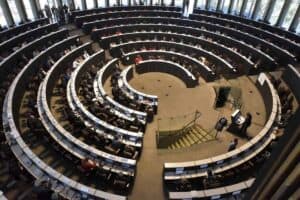South Africa’s economy will suffer greatly should the ANC enter into coalition with the EFF after the election, economists predict.

An ANC/EFF coalition will cause South Africa’s political-economic risk profile to deteriorate, with corruption and threats to the rule of law mounting once the EFF joins the ANC in government.
The lack of inclusive growth will remain the most significant risk factor, with weak economic growth, high inequality and unemployment straining the economic policy environment, Louw Nel, senior political analyst and Jee-A van der Linde, senior economist at Oxford Economics Africa, write in their second research briefing for the election about the ANC and EFF election scenario.
In this scenario, the ANC sees its share of the vote drop to 40% and an arrangement with smaller parties is no longer enough to give it a legislative majority. This means that it must make a deal with one of the two main opposition parties: the EFF or the DA and it chooses the EFF, Louw writes.
The ANC/EFF coalition will have over 230 seats in the National Assembly and will be free to appoint the president and government the member parties agree on. After some posturing and threatening, the ANC votes for the EFF’s choice of speaker, in return for the EFF’ vote for President Cyril Ramaphosa to serve or, at least, start a second full term as president, he expects.
“The radicals in the red berets demand and obtain positions in the economic cluster to advance their agenda of using the state to drive development and create jobs. The ANC/EFF coalition is replicated in Gauteng and KwaZulu Natal, while in the Western Cape the partnership, along with smaller parties, ousts the DA.”
ALSO READ: Post-election social unrest looms over SA – economist
Economic fall-out of an ANC/EFF coalition
Louw expects that the EFF will leave most of the governance to the ANC, but prioritise a few policies in alignment with the more statist faction within the liberation movement. He predicts that the relationship with the private sector will then become more adversarial.
They believe the ANC/EFF coalition government will struggle to rejuvenate the economy and sustainably create jobs and while public sector jobs might expand, the private sector will find it difficult to operate and inclusive economic and job growth will remain elusive.
Market risks will increase due to rising inflation, while the independence of the South African Reserve Bank (Sarb) will be threatened and economic growth will be sub-par.
Van der Linde writes the first economic effect of the news that the ANC and EFF are forming a coalition government will be seen on currency markets in the form of a selloff of the Rand. “The Rand/dollar exchange rate starts to weaken in the second quarter of 2024 and could briefly breach the R21.5/$ level in the third quarter.”
The weaker currency will lead to fuel price increases and transport inflation will move the consumer price index (CPI) up steadily, Van der Linde writes. “Our forecast in this scenario is for CPI inflation to average 5.6% in 2025, compared to 5.0% in our baseline forecast.”
Van der Linde also expects that the fiscal deficit will widen from a forecast 5.4% of gross domestic product (GDP) in 2024 to 5.6% of GDP in 2025, compared to 5.1% of GDP in the organisation’s baseline and then stabilise at the 5.5% of GDP level in the medium term.
“Although the economy will recover from the sluggish growth levels recorded in 2023 and 2024, real GDP growth will be only 1.2% in 2025 compared to 1.4% in our baseline and 1.3% in 2026 compared to 1.6% in our baseline,” Van der Linde writes.
ALSO READ: Risks from May election contributing to policy uncertainty in SA
Political-economic risk will see financial capacity risks increase
When it comes to political-economic risk, Louw writes that financial capacity risks will increase. “Widening budget deficits, short-term and consumption-driven government spending and more borrowing will worsen fiscal capacity concerns, which will mount in the medium term.”
Louw says political regime risk is the risk pillar that increases most significantly from their baseline and points out that this deterioration is due to the muddied coalition history between the ANC and EFF in local government, characterised by infighting, policy gridlock and instability.
“Should the national government mirror local governments where the ANC and EFF govern, frequent votes of no confidence, government collapses and unprecedented policy uncertainty will grip the nation and hamstring the economy.”
Louw writes that while political violence, polarisation and protests will increase under an ANC/EFF coalition, the difference is small compared to Oxford Economics’ baseline.
“Another significant change to our baseline scenario is the marked deterioration in South Africa’s operational environment. Businesses will find it increasingly difficult to work with an ANC/EFF government, with land expropriation fears, anti-competitive practices and state interference in the private sector underscoring the high risks in this scenario. Capital flight and a worsening brain drain will further squeeze business and slow the job creation rate in South Africa.”






